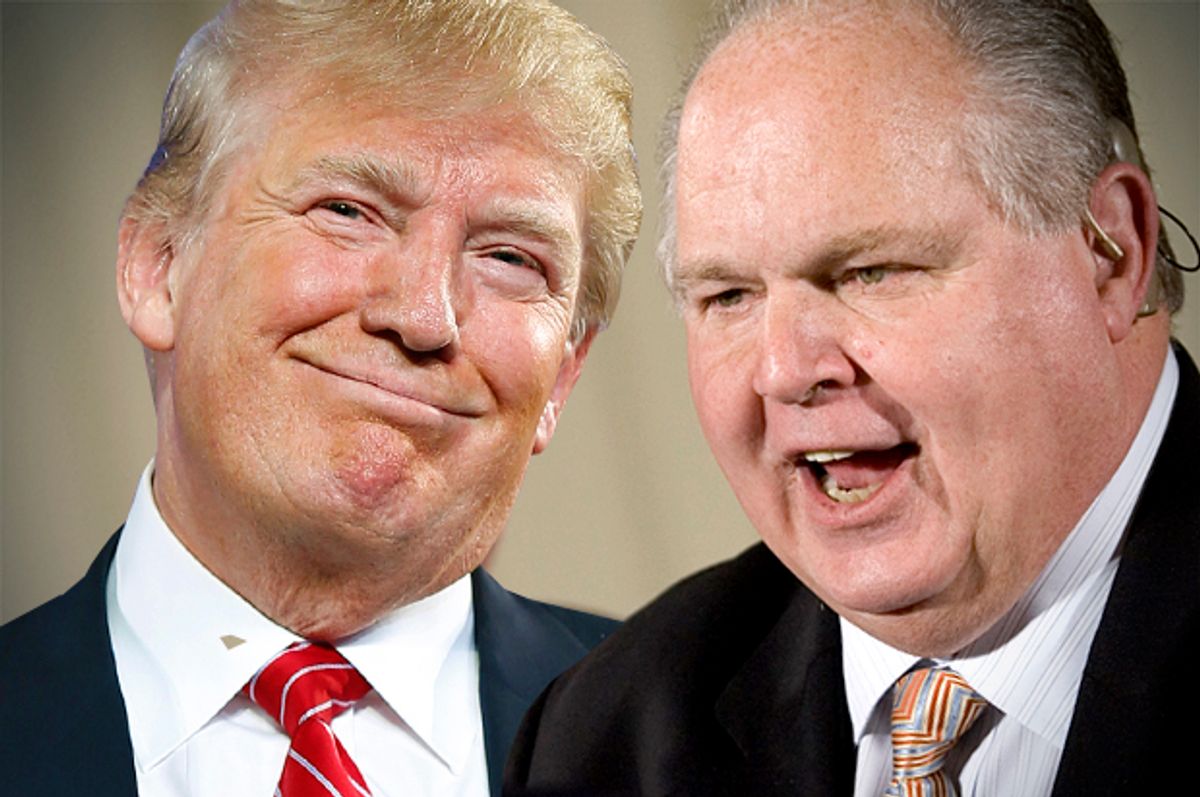The ongoing feud between Donald Trump and Fox News has put Rush Limbaugh in an admittedly uncomfortable position. "It's very hard when you know everybody involved and when you consider them friends," Limbaugh told listeners in the wake of Trump's announcement that he would skip Thursday's Republican Debate.
Though he was careful not to take sides, Limbaugh offered some interesting analysis of the conflict, casting it as an insider/outsider struggle:
Everything [Trump]'s doing goes against the book. Everything that any analyst or consultant or professional would tell you not to do, Donald Trump is doing it, and he's leading the pack. This creates its own set of emotions and feelings and thoughts that run from person to person. Now, the political business, if you want to look at it that way, is like any other business. It has its people who are considered the elites in it -- and like any business, they hate outsiders. They don't want outsiders just storming in trying to take over, and much less succeeding at it.
Like any group of elites, they're exclusionary.
They want to keep people out.
They want to be in charge of who gets in the club. They want to be in charge of who's allowed to rise or climb the ladder in the club. Politics is no different, and all of those determinations are made by who gets money and who doesn't. But Trump is functioning totally outside this structure that has existed for decades. As such, the people who are only familiar with the structure and believe in it and cherish it and want to protect it, feel threatened in ways that you can't even comprehend.
Limbaugh also described the cordial relationships he shares with Trump, moderator Megyn Kelly and Fox News head Roger Ailes. Limbaugh's fondness for Ailes and Kelly comes as no surprise — the three are natural allies as members of an influential and lucrative conservative media apparatus.
But Limbaugh's approval of Donald Trump as a candidate is not so easily explained.
Limbaugh has made a career out of deriding centrist RINOs (Republicans in Name Only) for their willingness to negotiate with Democrats and in the process sacrifice key conservative values. (See his frequent mocking references to Lindsey "Grahamnesty.") But in Trump, Limbaugh has offered consistently flattering coverage to a man who once supported abortion rights and the assault weapons ban, and told CNN in 2004, "In many cases, I probably identify more as Democrat."
It's no secret that Trump's conservative bona fides are far from rock solid, so why hasn't Limbaugh subjected Trump to the criticism one might expect he would aim at a former Hillary Clinton donor?
On one issue specifically, Trump has played right into Limbaugh's wheelhouse. The hard-line immigration rhetoric that fueled Trump's summer rise resulted in favorable Limbaugh coverage from the start of the campaign season. In July, Limbaugh praised Trump for having "changed the entire debate on immigration," calling it a "blinding achievement" and noting that he had "been saying similar things."
Limbaugh and Trump had been on friendly terms for some time before that. Limbaugh spoke of golfing with Trump back in 2011, and Trump has consistently praised the radio host for years on Twitter:
Trump's incentives to be on good terms with Limbaugh are obvious. Trump's a master of the media game and knows that sympathetic coverage from Limbaugh goes a long way with Republican voters.
Limbaugh's affection for Trump is more difficult to unravel. Conor Friedersdorf argues persuasively in The Atlantic that Limbaugh sees something of a kindred spirit in Trump as an insurgent against the party elites:
It’s no wonder that Limbaugh likes Trump. The talk-radio host also got fantastically rich selling ego, bombast, and brazenness to the masses, elitist tastemakers be damned. They’ve both been used by politicians who don’t, in truth, have much respect for them. Limbaugh seems to identify so much with Trump that he has now conflated their respective stories.
In other words, to Limbaugh, Trump's past transgressions against conservative orthodoxy are less important than his outsider status and stick-it-to-the-establishment bravado.
The fatal flaw in this line of thinking, as Friedersdorf points out, is that Limbaugh himself is a part of the establishment he regards with such venom. He may not be liked by party elites or confused by anyone for an heir to William F. Buckley, but his influence is certainly respected. Limbaugh spent his opening monologue Wednesday cataloguing his personal, often affectionate relationships with nearly every player in the GOP primary race. "[T]here's not a one of them who I consider a problem or an enemy," he explained. This is not the voice of someone outside the establishment.
As Republican backlash against Trump has intensified, best illustrated by the National Review's "Against Trump" issue, conservatives alarmed by Trump's success have been quick to attribute his rise to everyone but themselves. Almost all place a large share of the blame on Barack Obama. Some blame Jeb Bush for attacking Marco Rubio while allowing Trump to flourish.
Limbaugh blames Obama and moderate Republicans who failed to block his "radicalism." He told listeners, "If the Republican Party had actually been opposed to Obama and acted like it, the vacuum would not have existed making it much more difficult for Trump."
Salon's Bob Cesca points out that Republicans of any stripe searching for an explanation should perhaps look inward:
The truth is that Trump is a natural extension of Republican politics, set in motion long ago and amplified over the years. The presumptive GOP nominee represents a terrible amalgam of Fox News punditry and GOP extremism, both of which are inextricably bound to the party establishment — regardless of how hastily Limbaugh and others try to distance themselves from accountability for it.
In the end, the question of who is responsible for Trump's rise may well be irrelevant. If the National Review's rearguard action is unsuccessful, Trump will be the establishment candidate all Republicans have to live with.

Shares